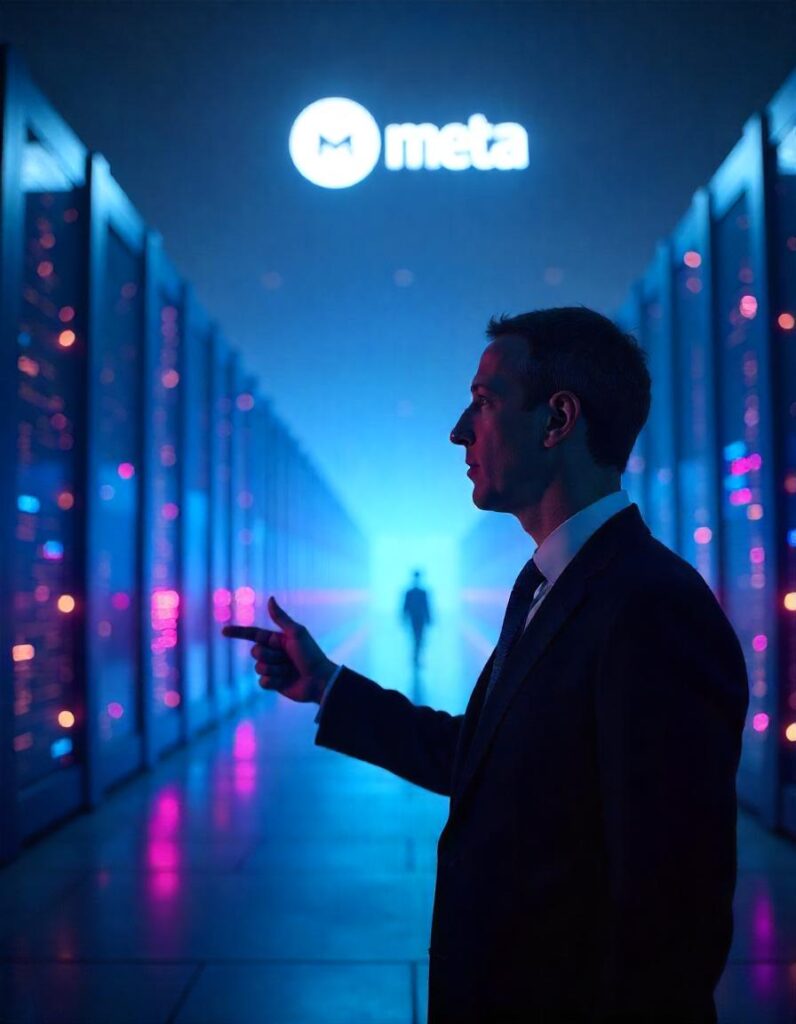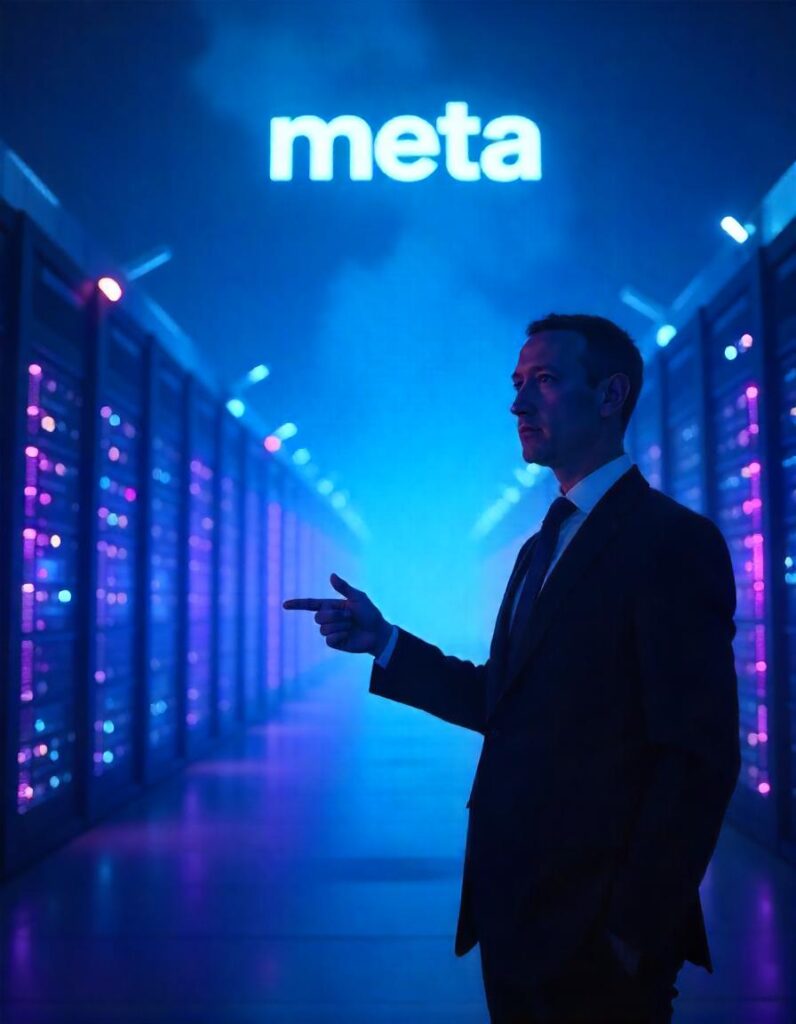Meta plans to invest billions in massive U.S.-based AI data centers like Prometheus and Hyperion to power future “superintelligence.”
Meta to Build AI Data Centers the Size of Manhattan
Prometheus: The First Mega-Scale Data Hub
Leading the charge is Prometheus, a multi-gigawatt data center set to launch in New Albany, Ohio, by 2026. Zuckerberg shared the update on Threads, Meta’s social platform, emphasizing that this is just one of several monumental data projects underway.


According to him, just one of these facilities could span an area almost as large as Manhattan—roughly 59.1 square kilometers. These aren’t ordinary server farms; they are being designed to support massive AI workloads and sophisticated infrastructure at an unprecedented scale.
Hyperion and More Titan Clusters on the Horizon
Another mega-cluster named Hyperion is planned for Louisiana, with full deployment expected by 2030. It will eventually scale up to five gigawatts, making it one of the most powerful data hubs in the world. Zuckerberg mentioned, “We’re building multiple more titan clusters as well,” each named to reflect their size and importance.
These projects will help Meta leap ahead in the AI race, aiming to develop systems capable of groundbreaking computation and decision-making—beyond even the smartest human minds.
Why Meta Is Going All-In on AI
Meta has traditionally generated the bulk of its revenue from online advertising, raking in over $160 billion in 2024 alone. But now, the company is betting big on AI as its next frontier. This pivot includes not just software development but also enormous hardware investments to support AI infrastructure.
Karl Freund, Principal Analyst at Cambrian AI Research, noted that Zuckerberg is “spending his way to the top of the AI heap.” He added that the AI talent Meta is attracting will benefit from some of the most advanced AI hardware available today.
Following the announcement, Meta’s stock rose 1%, contributing to an overall 20% gain so far this year, as reported by Reuters.
The Environmental Impact of AI Data Centers
While the scale and ambition of Meta’s AI projects are awe-inspiring, they come with environmental concerns. AI data centers are known for their high energy and water consumption. A recent study estimates that by 2027, such facilities could consume 1.7 trillion gallons of water globally.
To put that in perspective, a single AI request—like asking ChatGPT a question—can use roughly the same amount of water as a small bottled drink.
The Global Cloud Network

Currently, over 10,000 data centers around the globe support cloud computing. The United States leads in data center infrastructure, followed by the United Kingdom and Germany. With Meta’s new AI-focused centers, the U.S. is likely to solidify its dominance in this rapidly evolving space.
Final Thoughts
Meta’s colossal investment in AI data centers like Prometheus and Hyperion reflects its commitment to shaping the future of artificial intelligence. While this vision is bold and potentially transformative, it also highlights the growing need for sustainable and ethical AI infrastructure.
With names as grand as their scale, these projects could redefine the tech landscape—but the world will be watching how responsibly Meta navigates this massive shift.
FAQs About Meta’s Billion-Dollar AI Data Center Projects
1. What is Meta building in the United States?
Meta is constructing massive AI-powered data centers in the U.S. as part of its push into artificial intelligence. The two main projects announced are called Prometheus and Hyperion, which will support what the company calls “superintelligence” — AI systems more powerful than human thinking. These data centers are expected to be multi-gigawatt in capacity and cover vast areas.
2. What is the purpose of these AI data centers?
These AI data centers will power Meta’s large-scale artificial intelligence operations. From training powerful AI models to supporting services like Meta AI and Threads, these centers are designed to handle massive computational workloads. Ultimately, Meta aims to lead in developing advanced AI that can learn, reason, and solve complex problems on its own.
3. Where are these data centers being built?
- Prometheus is being built in New Albany, Ohio, and is expected to be operational by 2026.
- Hyperion will be located in Louisiana and should be fully online by 2030.
These locations were likely chosen for their land availability, infrastructure, and access to power and water sources.
4. Why are these data centers named Promet

heus and Hyperion?
The names are symbolic and reflect the scale and ambition of the projects. In Greek mythology:
- Prometheus is a Titan known for bringing fire (knowledge) to humanity.
- Hyperion symbolizes light and power.
Meta is likely using these names to convey the transformative nature of the technologies they plan to build.
5. How much is Meta investing in these AI projects?
According to CEO Mark Zuckerberg, Meta plans to spend hundreds of billions of dollars over the next few years. This includes building multiple large data clusters, hiring top AI talent, and acquiring the most advanced hardware for AI training and deployment.
6. What is the environmental impact of AI data centers?
AI data centers require huge amounts of electricity and water. One study predicts that by 2027, these centers could use up to 1.7 trillion gallons of water globally. Even a single AI request can use water equivalent to a small bottled drink. This raises concerns about sustainability and resource consumption.
7. How will these centers affect Meta’s position in the AI industry?
By investing in such large-scale infrastructure, Meta is positioning itself to compete with top AI companies like Google, Microsoft, and OpenAI. With state-of-the-art hardware and vast computing power, Meta aims to lead in developing next-generation AI models and services.
8. What impact has the announcement had on Metea’s stock?
Following the announcement, Metea’s shares rose by 1%, and overall, the stock has seen a 20% increase in 2025. This shows that investors are optimistic about the company’s long-term AI strategy.

I as well think so , perfectly indited post! .